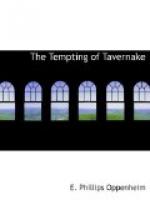Tavernake remained silent. He was conscious that his lack of response seemed both sullen and awkward, but he was for the moment tongue-tied. His habit of inopportune self-analysis had once more asserted itself. He could not understand the curious nature of his mistrust of this woman, nor could he understand the pleasure which her suggestion gave him. He wanted to refuse, and yet he was glad to be able to tell himself that he was, after all, but an employee of his firm and not in a position to decline business on their behalf.
She leaned a little towards him; her tone was almost beseeching.
“You are not going to be unkind? You will not refuse me?” she pleaded.
“I will bring you a list,” he answered heavily, “on the terms you suggest.”
“To-morrow morning?” she begged.
“As soon as I am able,” he promised.
Then he escaped. Outside in the corridor, the man who had interrupted his interview was walking backwards and forwards. Tavernake passed him without responding to his bland greeting. He forgot all about the lift and descended five flights of stairs. . . .
A few minutes later, he presented himself at the office and reported that Mrs. Wenham Gardner had decided unfavorably about Grantham House, and that she was not disposed, indeed, to take premises of anything like such a rental. Mr. Dowling was disappointed, and inclined to think that his employee had mismanaged the affair.
“I wish that I had gone myself,” he declared. “She obviously wished me to, but it happened to be inconvenient. By-the-bye, Tavernake, close the door, will you? There is another matter concerning which I should like to speak to you.”
Tavernake did as he was bidden at once, without any disquietude. His own services to the firm were of such a nature that he had no misgiving whatever as to his employer’s desire for a private interview.
“It is about the Marston Rise estate,” Mr. Dowling explained, arranging his pince nez. “I believe that the time is coming when some sort of overtures should be made. You know what has been in my mind for a very considerable time.”
Tavernake nodded.
“Yes,” he admitted, “I know quite well.”
“I did hear a rumor,” Mr. Dowling continued, “that some one had bought one small plot on the outskirts of the estate. I dare say it is not true, and in any case it is not worth while troubling about, but it shows that the public is beginning to nibble. I am of opinion that the time is almost—yes, almost ripe for a move.”
“Do you wish me to do anything in the matter, sir?” Tavernake asked.
“In the first place,” Mr. Dowling declared, “I should like you to try to find out whether any of the plots have really been sold, and, if so, to whom, and what would be their price. Can you do this during the week?”
“I think so,” Tavernake answered.




